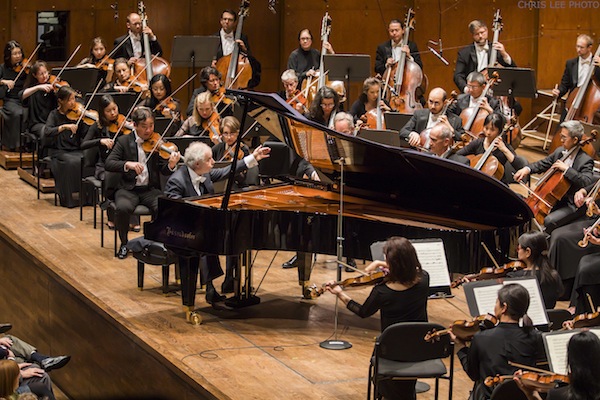Schiff provides intermittent rewards in duo roles with Philharmonic

András Schiff performed as piano soloist and conductor with the New York Philharmonic Thursday night at David Geffen Hall. Photo: Chris Lee
Pianist and conductor Sir András Schiff brought his A-repertoire to the New York Philharmonic Thursday night—Haydn, Bartók, Bach, Schumann—but he didn’t consistently bring his A-game.
On the podium for the concert’s first half, the Budapest-born musician redeemed a pallid Haydn Symphony No. 80 with a lively Bartók Divertimento for Strings. Later, as he conducted from the piano, the expected Schiffian richness of phrasing failed to materialize for much of Bach’s Keyboard Concerto in A major, BWV 1055, but it was present in abundance for Schumann’s Piano Concerto in A minor, Op. 54.
For three of its four movements, the concert’s opening symphony seemed destined to join the numberless host of bland Haydn performances given by big orchestras whose priorities lay elsewhere. The Symphony No. 80 in D minor, with its wildly diverse themes punctuated by sudden pauses, is some of Haydn’s oddest music (and that’s saying something), but on Thursday most of its rough edges seemed buffed off as it rolled along.
A conductor’s podium movements don’t usually rate reviewing, but in this case there seemed to be a direct relationship between Schiff’s limited vocabulary of gestures—consisting mostly of marking the downbeat and fluttering his hands to indicate crescendo–and the colorless results he was achieving with the players.
In the symphony’s final Presto, however, which out-Beethovens Beethoven with its relentlessly off-the-beat theme, the orchestra finally got out of neutral and gave a crackling performance. (Schiff took both of the indicated repeats, giving listeners a second chance to figure out Haydn’s gnarly syncopations.) At the end, the audience called the conductor back for a second bow, a rare occurrence these days with Classical-era program openers.
As if buoyed by that reception, Schiff served up some tasty Hungarian home cooking in Bartók’s Divertimento, with sweeping podium gestures to match. The strings expanded their color palette, digging deep into the robust dissonances, then slimming down tonally for the dance interludes. The Molto Adagio second movement began and ended in a pianissimo passage at the limit of audibility, a subtle “night music” surrounding a series of long, finely-sustained crescendos. Conductor and players reveled in the contrasts of the Allegro assai finale, energetic folk dance tunes in complex meters alternating with dreamy interludes, all seasoned with sassy humor.
A quartet of soloists consisting of the orchestra’s section leaders—violinists Frank Huang and Lisa Kim, violist Cynthia Phelps, and cellist Carter Brey—set the expressive tone throughout the Bartók piece, but especially with showy country fiddling and soulful melodies in the finale.
The concert’s second half consisted of a generous helping of concertos. Whatever one thought of Schiff’s abilities as a conductor, it came as a relief to hear the celebrated pianist finally put fingers to keys, enlivening Bach’s propulsive first movement with his dancing, articulate touch, which seemed to light a fire under the string orchestra as well.
Bach arranged this concerto for harpsichord from his original version for the mellow-toned oboe d’amore, and Thursday’s performance of the central Adagio would have benefited from a little less of Schiff’s trademark articulation and more of that old instrument’s plaintive legato. Harpsichordists typically use a lot of stretchy rubato for expression in music like this, and one would have welcomed a touch more of that in Schiff’s rather strict piano performance.
The pianist-conductor also adopted a steady, fast-minuet tempo for the finale, which moved things along nicely—maybe a little too nicely, as the music tended to plug along without much contour in the stepping-up sequences or the singing phrases. The orchestra seemed to lack energy as well, hanging back at moments when it should have asserted itself. One couldn’t help wondering if more sparks would have been struck if the orchestra had had its own conductor.
One could at least argue that Bach himself led his concertos from the keyboard. The same can’t be said of Schumann’s Piano Concerto, which debuted in 1845 with Ferdinand Hiller on the podium and Clara Schumann at the piano, inaugurating a tradition of distinguished pairings in this work.
Schiff’s taking both roles for himself led to some tentative playing and ragged ensemble in the orchestra while his hands were busy at the keyboard. On the plus side, it encouraged a chamber-music-style give and take among all players, a goal for concertos that the composer stated plainly in his critical writings (quoted in James M. Keller’s informative program notes).
It certainly helped that Schiff’s own playing was more inspiring than it had been in the Bach. Chords and single lines were superbly voiced, with Schumann’s handsome themes singing out over the rest of the piano texture, sparking lively responses from the other players and a rich orchestral blend in the tutti sections.
If Schiff’s tempos were on the fast side—leading at one point to a conspicuous difference of opinion with clarinetist Pascual Martínez Forteza in the first movement’s clarinet-and-piano dialogue—they encouraged a healthy flow in the music. The capricious second movement, for example, has rarely sounded so of-a-piece, with such deft handling of the transitions between its skipping piano tune and its lush cello melody.
The finale, while not exceptionally fast, still had that forward flow as it stepped out with poise and even a touch of swagger. After such delights as Schiff’s graceful leggiero passagework and the soloist and orchestra’s snappy game of catch with the main theme, this fluid performance gained momentum right into and through the exuberant coda.
The pianist responded to his well-earned ovation with the briefest of encores, a melodious rendition of “Happy Farmer, Returning from Work” from Schumann’s Album for the Young, Op. 68. One hoped piano pupils in the audience were taking note.
The program will be repeated 8 p.m. Friday and Saturday. nyphil.org; 212-875-5656.